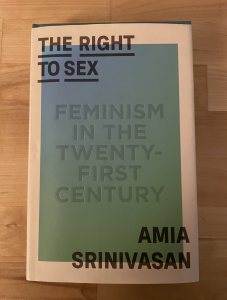 When I was asked to join the “Books We Read” team, I thought nothing of writing about the book I was reading at the time (sounds like the objective, right?). I had just started Amia Srinivasan’s “The Right to Sex: Feminism in the Twenty-First Century,” recommended by the New York Times Book Review the week prior. It’s not the first piece of contemporary feminist philosophy I have encountered. I recently read “Down Girl: The Logic of Misogyny,” by Kate Manne. I knew that these types of works tend to be dense essays with rigorous exploration of systemic issues in society affecting women. I read these for the thought-provoking concepts that play out in everyday life. As a musicology PhD student and fledgling feminist, these are the books I read for “fun”. As I worked my way through Srinivasan’s book, I encountered subjects, realities and descriptions that were hard to read. My mouth gaped open (under my mask) at times as I read on the train. “How am I going to describe this one?” The answer is: honestly.
When I was asked to join the “Books We Read” team, I thought nothing of writing about the book I was reading at the time (sounds like the objective, right?). I had just started Amia Srinivasan’s “The Right to Sex: Feminism in the Twenty-First Century,” recommended by the New York Times Book Review the week prior. It’s not the first piece of contemporary feminist philosophy I have encountered. I recently read “Down Girl: The Logic of Misogyny,” by Kate Manne. I knew that these types of works tend to be dense essays with rigorous exploration of systemic issues in society affecting women. I read these for the thought-provoking concepts that play out in everyday life. As a musicology PhD student and fledgling feminist, these are the books I read for “fun”. As I worked my way through Srinivasan’s book, I encountered subjects, realities and descriptions that were hard to read. My mouth gaped open (under my mask) at times as I read on the train. “How am I going to describe this one?” The answer is: honestly.
 The issues that Srinivasan presents are not fun, but they are important. Many examples given in Srinivasan’s book are also covered by Manne (notably the Isla Vista killings, the Brock Turner rape case and the Daniel Holtzclaw rape case). At times, her work comments on the prevailing thoughts already published regarding these events. Her point of view is fresh, unrelenting and direct. It is clear that she will not hold back from saying something in the most explicit terms if it will make the most sense (as in which type of bodies are more “f*&%able”). In this case, when discussing the politics of desire, prostitution, pornography, power dynamics, and carceralism, there is no beating around the bush with purely academic terms.
The issues that Srinivasan presents are not fun, but they are important. Many examples given in Srinivasan’s book are also covered by Manne (notably the Isla Vista killings, the Brock Turner rape case and the Daniel Holtzclaw rape case). At times, her work comments on the prevailing thoughts already published regarding these events. Her point of view is fresh, unrelenting and direct. It is clear that she will not hold back from saying something in the most explicit terms if it will make the most sense (as in which type of bodies are more “f*&%able”). In this case, when discussing the politics of desire, prostitution, pornography, power dynamics, and carceralism, there is no beating around the bush with purely academic terms.
Srinivasan’s commentary brings up new ways to consider standard dynamics, such as preferences on online dating apps in the vein of the systemic oppression of desire. She also goes deep in contemplating the side effects of consent legislation, anti-pornography legislation and anti-prostitution legislation. In all of these areas, it becomes clear that legal actions come up short.
I highly recommend these books, complete with their challenging topics and the even-more-challenging conundrums we face in the world as we know it. I realize that I am privileged to close the book after reading the chapters that make me uncomfortable and can move on to other concepts, other books, other things. For many, the extremes are their everyday reality. Srinivasan concludes that we must learn from and follow these people. It may not always be fun to do the work to uncover internalized misogyny and inequality in society. However, it is worthwhile if only to contribute to the remedy in a small capacity.
 Research Guides from Rutgers Libraries
Research Guides from Rutgers Libraries
By Natalie Borisovets (Newark)
Related books in the Mabel Smith Douglass Library Collection
- Crowley, H., & Himmelweit, S. (1992). Knowing women : feminism and knowledge. Polity Press in association with the Open University.
- Edwards, J., & Cornwall, A. (2014). Feminisms, empowerment and development: changing women’s lives. NBN International.
- Edwards, K. W. (2019). Now is the acceptable time : a modest memoir of a memorable life. The Author.
- Freedman, J. (2001). Feminism. Open University.
- Malhotra, S., & Carrillo Rowe, A. (2013). Silence, feminism, power : reflections at the edges of sound. Palgrave Macmillan.
- Serano, J. (2013). Excluded : making feminist and queer movements more inclusive. Seal Press.